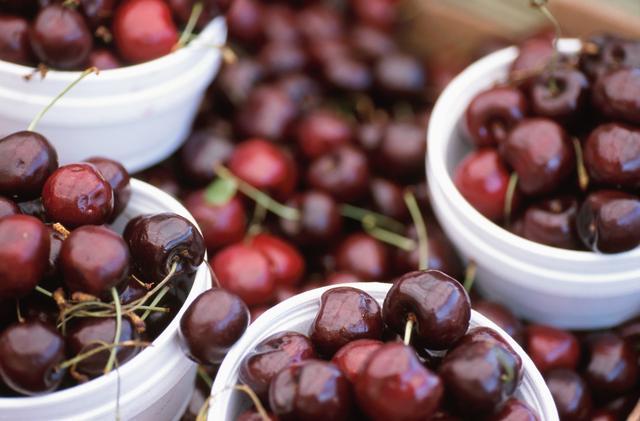 |
Cherries protect against oxidative stress:
The colors of sweet and sour cherries come from their rich supply of anthocyanins, including chlorogenic acid, quercetin, and kaempferol.3,4 Regarding antioxidant content, cherries are some of the highest ORAC (oxygen radical absorbance capacity) foods in existence – the ORAC score of sweet cherries ranks just as high as strawberries (though not quite as high as blueberries).5
Anthocyanins protect the body against oxidative damage in a number of ways: they scavenge free radicals directly, bind to DNA to protect it from oxidative damage, and activate detoxification and antioxidant enzyme systems in the body. Cherry anthocyanins have been shown to protect blood vessels and brain cells against oxidative stress, implying that cherry consumption may help to prevent atherosclerotic plaque formation and neurodegenerative diseases like dementia.3,6 Cherry anthocyanins also slow the growth of human colon cancer cells.7
Cherries reduce inflammation:
Cherries and cherry juice have been used by sufferers of gout and arthritis to ease their symptoms. Gout results from an overload of uric acid in the blood (hyperuricemia), which accumulates and forms crystals in the joints, causing painful arthritis; cherry consumption has been shown to reduce circulating levels of uric acid, which may be one pathway by which cherries improve gout symptoms.8
New evidence presented in April at the Experimental Biology 2011 meeting related the anti-inflammatory effects of tart cherry juice to both gout and heart disease. Overweight and obese subjects consumed 8 ounces/day of tart cherry juice or placebo for 4 weeks. Tart cherry juice consumers experienced reductions in uric acid levels and inflammation markers. With regard to cardiovascular disease, reductions were also seen in triglycerides, VLDL, and monocyte chemoattractant protein-1 (MCP-1), a molecule involved in atherosclerotic plaque formation.9 Previous studies on sweet cherry consumption have similarly documented reductions in C-reactive protein (CRP), another inflammatory molecule that is also a marker of cardiovascular disease risk.10
Cherries act as a natural painkiller:
Cherry extracts inhibit the action of cyclooxygenase-1 (COX-1) and COX-2 enzymes. These enzymes are important components of the inflammatory process and the sensation of pain. Also, these are the same enzymes that are inhibited by many common pain medications. In fact, the COX inhibitory activity of cherry anthocyanins is comparable to that of equal concentrations of ibuprofen and naproxen.11,12 This may be another way that cherries and cherry juice can ease symptoms of gout and arthritis, and also may help athletes to cut down on post-workout muscle pain. Distance runners training for a race who drank tart cherry juice twice daily for 8 days (7 days prior to race plus race day) experienced less post-race pain than those who drank a placebo.13 Similarly in strength workouts, tart cherry juice consumers experienced less pain and strength loss over the four following days compared to placebo.14
Cherries may help you sleep:
Tart cherries are one of the few rich food sources of the hormone and antioxidant melatonin, which regulates the sleep-wake cycle in the human brain.15 Tart cherry juice supplementation has been associated with improvements in sleep quality.16
When we think about high-antioxidant, health-promoting fruits, sometimes cherries are overlooked. But as you can see here, cherries are an excellent food that benefits the heart, brain, and joints, and may even prevent tumor growth and improve the quality of sleep – and they will be in season very soon, so enjoy them!
The cherry is a stone fruit, in the same family with plums, apricots, and peaches. The majority of edible cherries have been derived from two species: Prunus avium – the wild cherry (sweet cherries like Bing and Rainier) and Prunus cerasus – the sour cherry (like the Montromorency and Morello varieties). Most sour cherries here in the U.S. are grown in Michigan with some growing on the East coast as well, and sweet cherries are grown primarily in the Pacific Northwest and Michigan.1 Cherries, especially sour cherries, have a short growing season. Sweet cherries are generally available between May to August, and sour cherries are available for just a couple of weeks either in mid-June (in warmer areas) or either July-August (in cooler areas).2
 |
| Add caption |